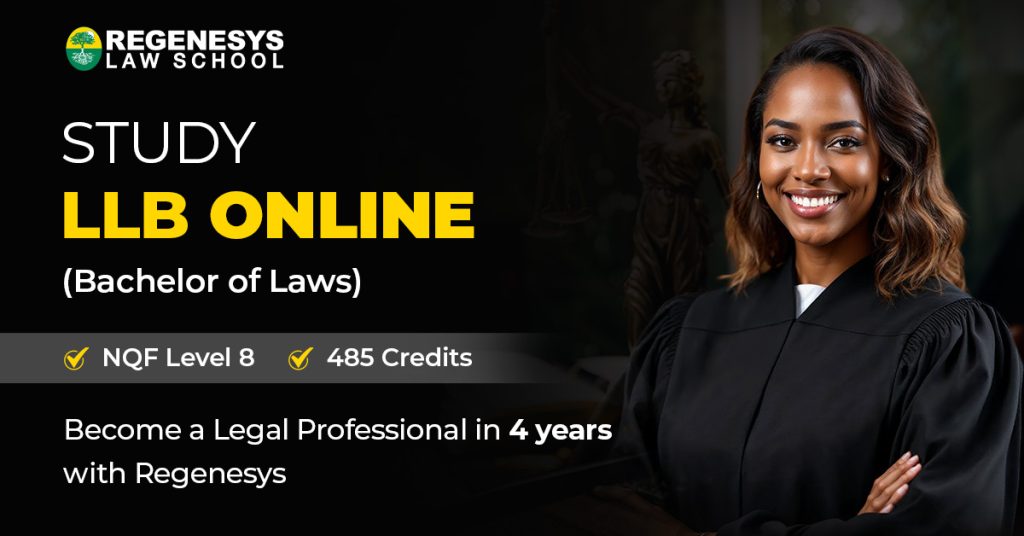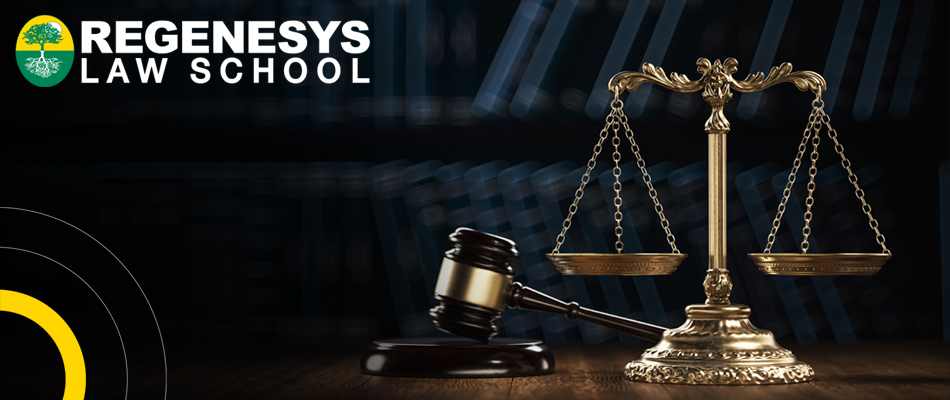Planning for a legal career can feel overwhelming, but it becomes manageable when you know what to focus on in school and at university. This article explains the school subjects needed to become a lawyer, what to study in Grade 10 and Grade 12 (Matric), and the career pathway after getting the LLB degree.
It provides practical, accurate information, so learners and parents can plan with confidence. If you are aiming to study law in the future, read on to also learn the Bachelor of Laws entry requirements, the number of years it takes to study law in South Africa, and more.
Table of Contents
Matric Subjects Required For Law
When preparing for a legal career in South Africa, you must have a solid foundation in the essential subjects needed to study law. These subjects will help you build the skills you need to study legal practices and meet the admission requirements for the LLB – Bachelor of Laws programme.
To get into an LLB programme, like the one at Regenesys Law School, you must focus on the following subjects:
English Home Language Or English First Additional Language:
Proficiency in English is critical for studying law, as it is the primary language of instruction and practice. To get into Regenesys Law School, you need at least 50% in English if it is your first language or 60% if it is your second language. This shows that you have the language skills needed to succeed in law studies and to explain complex legal ideas clearly.
Mathematics/Mathematical Literacy:
Mathematics or Mathematical Literacy helps you solve problems and think. For Regenesys Law School, Mathematics is not strictly required. However, having a good grasp of Mathematical Literacy can benefit your legal studies. Apart from these subjects, there are several criteria for admission to the LLB (Bachelor of Laws) programme at Regenesys Law School.
Here are the necessary requirements:
- Matric with a Bachelor’s pass or NQF level 4 equivalent qualification, or
- An admission points score (APS) of 26 on your National Senior Certificate or
- If from another African country, A Levels with a higher-level pass
- If you are older than 23 with no Bachelor’s Pass, you must have a school-leaving certificate (Grade 12 or O-level), three years of relevant work experience, and a pass in English.
Read more on What is a Bachelor of Laws (LLB) degree?

School Subjects Needed To Become A Lawyer
Choosing the right school subjects can help you prepare early and set a solid foundation for a career in law in South Africa. School subjects that improve your reading, writing, thinking, and communication skills are fundamental. While no single subject guarantees admission, the right combination can make law studies easier and more seamless for you.
Find below the recommended subjects to take in grades 10 and 12 in view of becoming a future lawyer:
Subjects To Take In Grade 10 For Future Lawyers
The subjects you choose in Grade 10 will set the stage for your future legal studies and career. Although there are no specific requirements at this stage, selecting the right subjects can lay a strong foundation for your journey into law. It will help you build critical skills and knowledge. As a result, you will be better prepared for the challenges of legal education and a successful career in the field.
Given below are the key subjects you need to focus on in Grade 10 to become a lawyer:
- English: Proficiency in English is essential for reading, writing, and understanding complex legal materials. It helps you develop strong communication skills, which are crucial for both studying and practising law.
- History: Studying history helps you understand the development of legal systems and the historical context behind laws. Knowing history will provide valuable insights into how laws evolve and their impact on society.
- Business Studies: This subject introduces you to basic concepts in business, economics, and entrepreneurship. Understanding these concepts benefits students pursuing areas of law related to corporate and financial matters.
- Life Orientation: Life orientation helps you build personal skills and understand societal issues. It can improve your ability to handle ethical dilemmas. Moreover, it develops a sense of social responsibility, which is important for a legal career.
Read More: An Overview of the Core Subjects in a Bachelor of Laws Programme.
Subjects Needed In Grade 12 To Pursue A Career In Law
While Grade 10 subjects start preparing you for a legal career, Grade 12 subjects are even more important for getting into university and studying law. Hence, at this grade, along with foundational subjects like English, History, and Business Studies, you should also focus on specific subjects.
The following subjects will help you build the skills and knowledge necessary for a successful legal education and career:
- Information Technology: Being good with computers and software is important because much of the legal work is done online. Knowing how to use IT helps you manage documents and research more effectively.
- Political Science: This subject teaches you about government systems and laws. Understanding politics and how laws are made is helpful for a legal career, especially if you are interested in public policy.
- Public speaking: Public speaking helps you communicate clearly and confidently. This is crucial for presenting cases in court and talking with clients.
- Psychology: Psychology helps you understand human behaviour and motivations. This knowledge can be helpful in working with clients and understanding their actions in legal cases.
Read more on LLB Requirements in South Africa.
Subject To Career Pathway After Getting An LLB Degree
| Matric / School Subject | Typical Careers |
| English (Home language / First Additional Language) | Attorney, Advocate, Legal Adviser, Academic |
| Mathematics / Math Literacy | Corporate Lawyer, Tax Adviser, Compliance Officer |
| History | Public Interest Lawyer, Policy Analyst, Judge’s Clerk |
| Business Studies / Accounting | Corporate Counsel, In-house Legal Adviser |
| Information Technology | IT Law Specialist, IP Lawyer, Legal Tech Consultant |
| Political Science | Government Lawyer, Policy Maker, Public Prosecutor |
| Public Speaking / Drama | Litigator, Advocate, Public Prosecutor |
| Psychology | Family Lawyer, Criminal Defence, Forensic Legal roles |
Read more on Why Choose an LLB Programme in 2026?

Explore Our Other Programmes
Conclusion
Pursuing a career in law can be a fulfilling way to make a difference in society and promote justice. However, while preparing for a law career, choosing the right subjects in high school is important. Understanding the subjects needed to become a lawyer helps you meet the admission requirements for a LLB – Bachelor of Laws programme and prepares you for a successful legal career.
For those ready to take the next step in their legal journey, Regenesys Education offers an LLB – Bachelor of Laws programme through the Regenesys Law School. With a well-structured curriculum and experienced instructors, you will get the essential knowledge and skills needed for a successful legal career.
Contact us today to speak with a career adviser.
FAQs
What qualifications do I need to be a lawyer in South Africa?
You need an accredited LLB degree, complete practical legal training or articles, and pass the Admission Examinations set by the Legal Practice Council to qualify as a lawyer in South Africa.
How long does it take to complete a LLB – Bachelor of Laws degree in South Africa?
The LLB degree takes four years to complete. It is a comprehensive programme with 485 credits, equivalent to an honours degree, providing essential legal knowledge and skills.
What skills can I expect to gain from studying for an LLB degree?
You will develop research skills, gain practical experience through clerkships, enhance public speaking abilities, and improve writing and critical thinking skills essential for legal practice.
What should I focus on in Grade 10 to prepare for a law career?
Focus on English for communication skills, History for legal context, Business Studies for economic basics, and Life Orientation for personal and social skills, all of which build a strong foundation for law studies.
What career opportunities are available with an LLB degree?
An LLB degree opens doors to various careers, including practising as an attorney or advocate, legal advisor, corporate lawyer, or roles in public policy, academia, and legal consultancy, among others.








